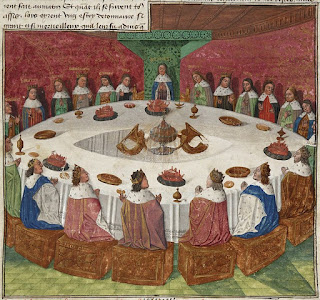Some seven centuries prior to the famous Cartesian maxim Cogito ergo sum (originally formulated with the French Je pense, donc je suis), another mathematician and philosopher—plus notably a physician, who attested that all medicine was guesswork and theoretical—from Persia (presently in part of Uzbekistan, those a creature of the courts through the realm) called Abu Ali al Hussein ibn al Sini (Latinised as Avicenna) prevision the philosophy of self as a first principle (or evidence thereof) by supposing a floating man—suspended in a sensory-deprivation tank as it were.
 For Avicenna’s next trick, he deduced the argument of infinite regression and first-causes to prove the logical necessity of a creator to set everything in motion—whose reasoning and nomenclature influenced philosophers and theologians, many luminaries tilling the same ground, until the present day. Building off Aristotle’s taxonomy, Avicenna figured that there were three kinds of things in the Universe, putting them into sets like a good mathematician: one, those things which can not be, like a square-circle, an anti-whale or infinity plus one—though we might be able to imagine otherwise; two, that which exists in the physical world which are contingent on something else—that is everything with a parentage and a history, from a tablet computer to the Andromeda Galaxy, and up to a point, we are able to tell that story (for things that do not exist but could, there are the same antecedent causes that we might also account for, like there never having been a Persian Empire because Alexander the Great was never born); the third sort of thing exists without being contingent on any else—unmade and the creative impetus, the divine (Aristotle believed that the Universe had not origin and was eternal). That’s pretty tidy and has been championed by countless thinkers since. Avicenna’s statements, however, eventually fell out of favour with the theological establishment believing he was degenerating the faithful with his mathematical proofs, as I suppose that the same articles of faith are superfluous in a logical framework. The Cartesian Cogito also retains its relevance, influence and heritage (currency and cachet) but post modern thinkers introduced yet another element of doubt that creates a pretty big whole in Descartes’ regression and progression about what that I was that was doing the reflecting was. Was it really me or is it us, and since the present is the only thing one fancies himself positive of (since false memories could also be implanted) and that’s always slipping away (so we suppose)—is anything more possible than pre-reflection that doesn’t essay the heart of doubt? But that is for another post.
For Avicenna’s next trick, he deduced the argument of infinite regression and first-causes to prove the logical necessity of a creator to set everything in motion—whose reasoning and nomenclature influenced philosophers and theologians, many luminaries tilling the same ground, until the present day. Building off Aristotle’s taxonomy, Avicenna figured that there were three kinds of things in the Universe, putting them into sets like a good mathematician: one, those things which can not be, like a square-circle, an anti-whale or infinity plus one—though we might be able to imagine otherwise; two, that which exists in the physical world which are contingent on something else—that is everything with a parentage and a history, from a tablet computer to the Andromeda Galaxy, and up to a point, we are able to tell that story (for things that do not exist but could, there are the same antecedent causes that we might also account for, like there never having been a Persian Empire because Alexander the Great was never born); the third sort of thing exists without being contingent on any else—unmade and the creative impetus, the divine (Aristotle believed that the Universe had not origin and was eternal). That’s pretty tidy and has been championed by countless thinkers since. Avicenna’s statements, however, eventually fell out of favour with the theological establishment believing he was degenerating the faithful with his mathematical proofs, as I suppose that the same articles of faith are superfluous in a logical framework. The Cartesian Cogito also retains its relevance, influence and heritage (currency and cachet) but post modern thinkers introduced yet another element of doubt that creates a pretty big whole in Descartes’ regression and progression about what that I was that was doing the reflecting was. Was it really me or is it us, and since the present is the only thing one fancies himself positive of (since false memories could also be implanted) and that’s always slipping away (so we suppose)—is anything more possible than pre-reflection that doesn’t essay the heart of doubt? But that is for another post.
















